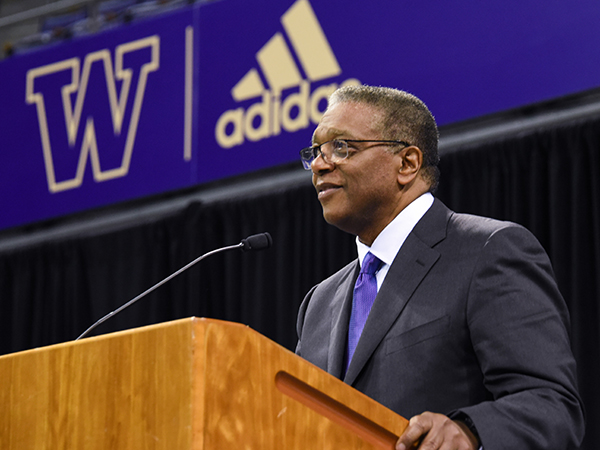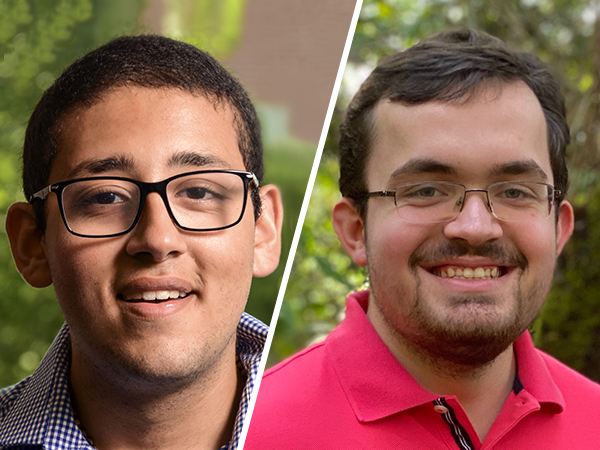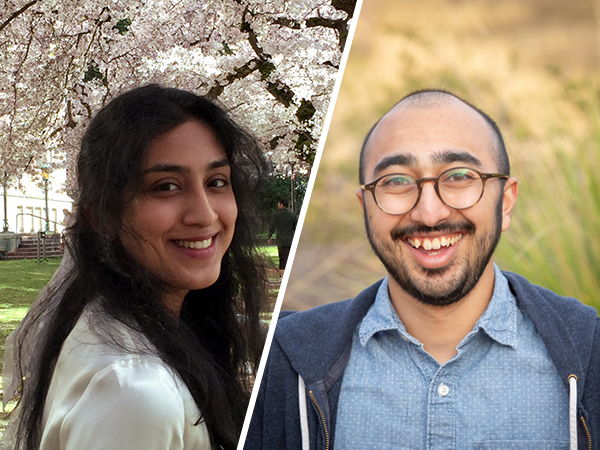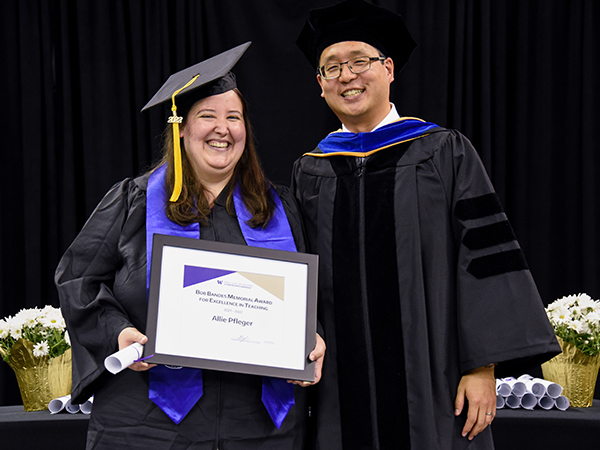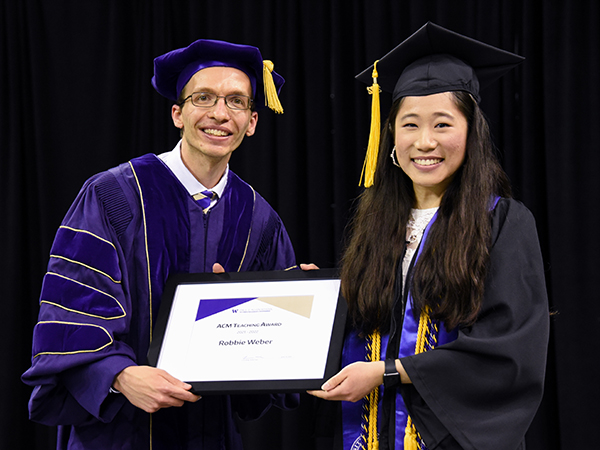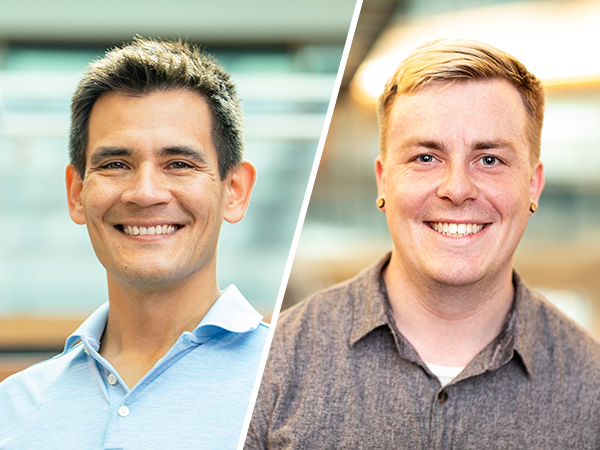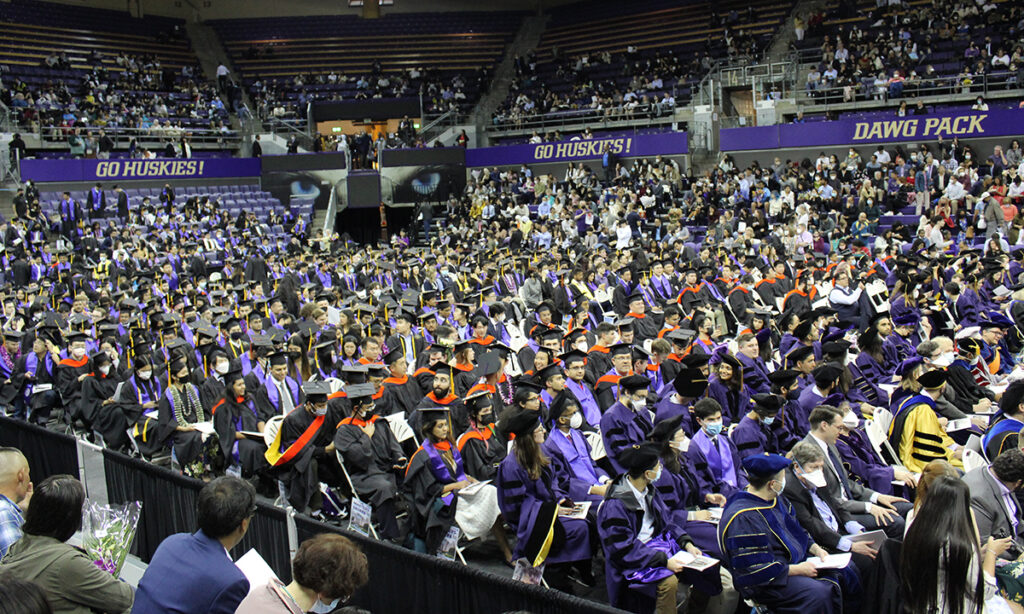
After two successive years of asynchronous, online tributes to graduates, the Allen School finally welcomed members of the classes of 2020, 2021 and 2022 to an in-person graduation celebration to mark the culmination of their academic journeys at the University of Washington. An estimated 3,000 faculty, staff, family and friends converged on Hec Edmundson Pavilion at the Alaska Airlines Arena on June 10th to honor the graduates’ achievements and recognize the impact that an Allen School education can have — not just on the lives of those who crossed the stage, but also on the world at large.
“We are counting on you”
Magdalena Balazinska, professor and director of the Allen School, acknowledged the immense challenges overcome by this group of graduates to reach this milestone. She expressed her pride in all that they had accomplished during their time at the school—and her belief in what they can accomplish in the future.
“Today, we at the Allen School are thrilled to join your families and friends in celebrating this momentous achievement. But tomorrow, we are counting on you,” said Balazinska. “The world needs your generation with your passion, your technical skills, your energy, and your commitment to your community and to the world. You now have the skills and knowledge to make the world a better place.
“Go out there, be brave, be kind, and do great things.”
Next stop: the north pole
Longtime friend to the Allen School Ron Howell, retired CEO of the Washington Research Foundation, joined in the celebration as the featured graduation speaker. In candid remarks, he shared the lessons he learned from his personal journey navigating severe depression for decades while building and maintaining a successful career in technology.
Howell used the metaphor of a sphere, the surface of which represented the various feelings, or “affects,” that people might experience throughout their lives. The very top of this sphere — the north pole — is a place of optimism, calmness, confidence, competence and resilience, while the south pole is home to the opposite. Howell offered the graduates his roadmap to the north pole. Some of the directions took the form of practical advice — eat right (“mostly vegetables”), exercise, meditate — while others served as reminders to extend grace to themselves as well as those they encounter along the way.
“Practice kindness and gratitude and forgiveness….and start with yourself,” he advised the graduates. “The stories that you tell yourself, and the voices that you use to tell yourself things, matter.”
Howell’s parting words were, perhaps, particularly relevant to those about to enter an industry characterized by constant striving. “Your success is not as important as you. You are more important than your success. Remember that,” he said.
“I’ll see you at the north pole.”
Making the world a better place
One of the Allen School’s graduation traditions is recognizing accomplished alumni who exemplify the qualities of technical excellence, leadership and service. While the pandemic disrupted these plans over the past two years, professor Ed Lazowska, the Bill & Melinda Gates Chair Emeritus at the Allen School, was finally able to reprise his customary role in the program to recognize 2020 recipients Emma Brunskill and Kirk Glerum, and 2022 recipients Brad Calder and Heather Underwood.
“You’re joining a long line of men and women who have built on their Allen School education to go out and make the world a better place,” Lazowska informed the graduates.
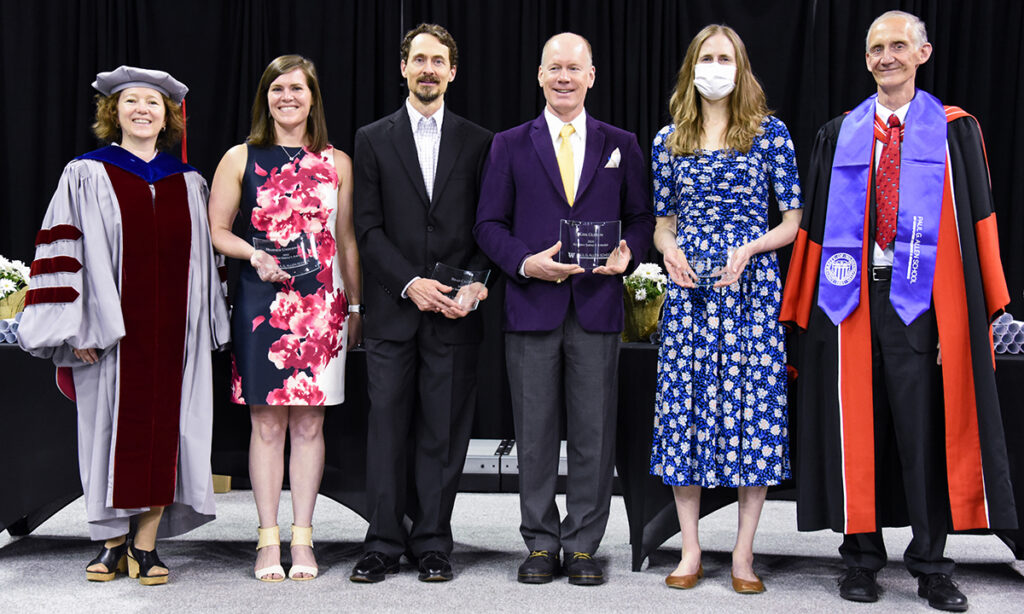
Emma Brunskill (B.S., ‘00)
Emma Brunskill earned bachelor’s degrees in Computer Engineering and Physics from the UW before earning a Rhodes Scholarship to Oxford University, where she obtained a master’s degree in neuroscience on her way to earning her Ph.D. from MIT. Brunskill subsequently completed a postdoc at University of California Berkeley before joining the faculty of Carnegie Mellon University. She later moved to Stanford University, where her research focuses on the development of robust artificial intelligence systems for use in health care and education that make good decisions despite being inherently data-limited.
“Emma has already amassed an amazing collection of accomplishments and contributions, and unlike me, has decades of them still ahead of her,” Lazowska said with a smile.
Kirk Glerum (B.S., ‘83)
“Customers hate crashes.” Those words, and what followed them in a two-page memo Kirk Glerum wrote back in 1998, would end up revolutionizing software reliability. Glerum was a member of the Microsoft Office team, which he joined a few years after graduating from the UW with degrees in Computer Science and Mathematics. With web-based communication becoming more common, he envisioned a way to save future customers from the sight of the dreaded dialog box by introducing a crash reporting system to enable the company’s developers to issue fixes. Glerum’s solution was, Lazowska noted, “a game-changer for Microsoft which ultimately became common across the industry.”
Glerum spent 22 years at Microsoft. Now “happily retired,” he and his family have supported his alma mater in multiple ways, including creation of the Glerum Family Endowed Scholarship and Glerum Family Endowed Fellowship to support Allen School undergraduate and graduate students who demonstrate financial need.
Brad Calder (B.S., ‘91)
Brad Calder is another who earned degrees in both Computer Science and Mathematics from the UW, after which he went on to earn his Ph.D. from the University of Colorado at Boulder. From Digital Equipment Corporation’s Western Research Lab, to the University of California San Diego faculty, to Microsoft and, now, Google, “Brad has truly done it all,” observed Lazowska.
Before leaving academia for industry, Calder graduated 14 Ph.D. students and published over 100 research papers on systems, architecture and compilers. At Microsoft, Calder was a member of the team that founded the company’s Azure cloud project in 2006. Now, at Google, he serves as Vice President and General Manager of Google Cloud Platform and Technical Infrastructure. In this role, he oversees product and engineering for hardware, compute, networking, storage, databases, and data analytics.
Heather Underwood (B.S., ‘09)
Heather Underwood is a prime example of the almost limitless paths open to holders of a computer science degree. Her research has spanned computer science, global health, human-centered design, education and international development. While working on her Ph.D. at CU Boulder advised by fellow Allen School alum John Bennett (Ph.D., ‘88), Underwood developed PartoPen, a digital pen application used to monitor maternal labor and reduce birthing complications in the developing world. After serving on the faculty of CU Boulder and as executive director of Denver BioLabs, she served as a Biodesign Fellow at Stanford University on the way to becoming a full-fledged medical device and health technology entrepreneur.
Currently CEO of EvoEndo, which has developed a safer and more affordable single-use alternative to sedated endoscopy, “Heather, like all of our Alumni Impact Award recipients, is changing the world,” Lazowska concluded.
Recognizing the next generation of leaders and innovators…
Outstanding Senior Awards
The Allen School recognized two graduating students with Outstanding Senior Awards for demonstrating superior scholarship, leadership potential and the ability to create and apply new knowledge in the field of computing.
Honoree Joseph Schafer earned a bachelor’s degree in Computer Science with a minor in Ethics. As a social media data analyst in the UW Center for an Informed Public, Schafer has made significant contributions to qualitative and quantitative research to understand and respond to the spread of mis/disinformation on social media on topics related to politics, elections and the COVID-19 pandemic. Schafer also served as a teaching assistant (TA) and as an officer of the Student Advisory Council. He recently earned a Graduate Research Fellowship from the National Science Foundation to continue his research as a Ph.D. student in UW’s Department of Human Centered Design & Engineering.
Recent Computer Engineering graduate Peter Michael (B.S., ‘21) was honored for his research contributions at the intersection of computer graphics, vision, and machine learning, with a particular emphasis on machine learning-based virtual green screen algorithms — similar to those used in Zoom’s background replacement feature — through a year-long collaboration between UW and Runway ML. He also served as a TA for courses focused on all three subjects and in linear algebra. Michael, who completed his bachelor’s degree last fall and went on to earn his fifth-year master’s from the Allen School in just two quarters, will pursue a Ph.D. at Cornell University next year.
Undergraduate Service Awards
The Undergraduate Service Awards recognize outstanding graduating seniors who have taken an active role in building community by contributing to Allen School activities and events. This year, the school honored four graduates for their service.
Nayha Auradkar was described as “fiercely dedicated to making the communities around her more inclusive.” After serving as president of Huskies Who Stutter, Auradkar founded and led Ability, an Allen School student group focused on connecting students with disabilities and raising awareness of accessibility issues. She also spent nearly two and a half years as chair of ACM-W focused on cultivating a community for women in computing.
Neha Jagathesan “goes above and beyond in everything she does.” This holds particularly true for her work with the Allen School’s Diversity & Access team, for which she has served as an ambassador and lead ambassador helping to build high school students’ interest in computing, and her contributions to the school’s five-year strategic plan for increasing diversity, equity, inclusion and access throughout our community.
Lucy Jiang is known as a “phenomenal student leader” who has taken on many roles in service to the Allen School community. As chair of the UW student chapter of the Association for Computing Machinery (ACM), she oversaw the organization’s first-ever fundraisers to support local causes such as the University District Food Bank, Code.org, and Seattle Children’s Hospital. She also represented the student voice on the school’s Diversity Committee and Curriculum Committee.
Aerin Malana co-founded and chaired GEN1, an Allen School student group that offers support for those who are the first in their families to pursue a U.S. bachelor’s degree. “Committed to bringing visibility and fostering community” among first-generation students, Malana helped surface a college experience that, too often, can be an invisible one. She has also served as an officer of ACM-W and handled logistics for the DubHacks collegiate hackathon.
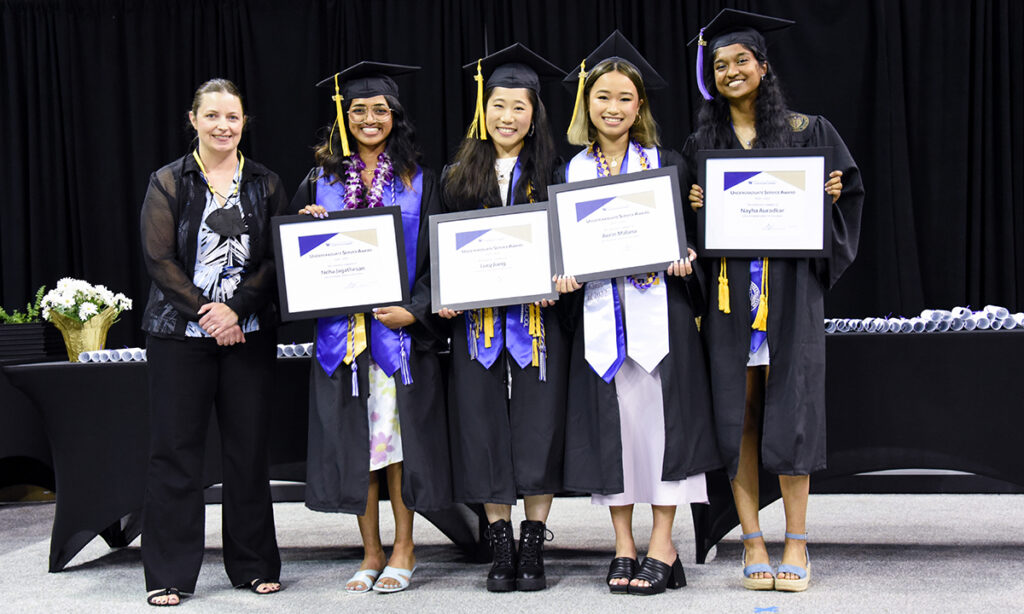
Best Honors Thesis Award
Each year, the Allen School recognizes a graduating senior who has completed an outstanding independent research project working with a faculty advisor as part of the requirements for Allen School honors. The 2022 Best Honors Thesis Award went to Lucy Jiang for “Flipping the Script: Co-Designing Systems to Support Blind and Low Vision Audio Description Scriptwriters,” completed under the supervision of professor emeritus Richard Ladner. Audio description is an essential function for making videos accessible to BLV audiences, but those audiences are typically excluded from the AD creation pipeline. Jiang conducted interviews and user studies with BLV audiences and AD writers to understand the barriers to accessibility and then applied those insights to the design of AccessbleAD, a system for making AD writing more accessible to BLV users.
…And honoring those who inspired them
Bob Bandes Memorial Award
The Bob Bandes Memorial Award recognizes outstanding teaching assistants (TAs) in the Allen School for their contributions to the classroom and their fellow students’ success. This year, the school selected three winners and three honorable mentions out of approximately 200 TAs nominated by faculty and the students who learned from them.
Winner Shreya Jayaraman has served as a TA for a total of 8 quarters for Foundations of Computing I and II, as both an undergraduate and a graduate student in the Allen School’s BS/MS program. According to one faculty member who worked with her, “Shreya was one of the best TA’s I’ve ever worked with: knowledgeable, responsible, and a natural teacher.”
Fellow winner Soham Pardeshi has been a TA as both an undergraduate and a graduate student in the BS/MS program for a near-record 14 quarters spanning five different courses: Computer Programming II, Intermediate Data Programming, Foundations of Computing I, Software Design and Implementation, and Introduction to Algorithms. According to one student, “Soham is by far the best TA I have had at UW. It is obvious he cares about the wellbeing and success of his students.”
Last but not least, winner Allie Pfleger, who is about to enter the Allen School’s BS/MS program, is also about to enter her 7th quarter as a TA this summer. As an undergraduate, she assisted with multiple quarters of Foundations of Computing I, Systems Programming and The Hardware/Software Interface. According to one of her former students, “She deserves more than this award, she deserves part of my degree when I eventually earn it!”
The Honorable Mention recipients were Dylan Hartono, Abhishek Shah, and Nicolas Suhardi. Students who studied with Hartono, an undergraduate TA for five quarters, lauded him for being “efficient, thorough, knowledgeable, and kind.” Shah, a student in the BS/MS program, has served as a TA for four quarters and was recognized for going the extra mile to help students while offering “an engaging and welcoming learning experience.” Suhardi, an undergraduate who has assisted with five quarters of the Introduction to Programming course, was recognized for doing his best to help students develop “a thorough understanding and love of CS.”
ACM Teaching Awards
Lucy Jiang, president of UW ACM, announced the recipients of the ACM Teaching Awards highlighting faculty excellence. This year, the students broke from tradition by opting to recognize three faculty members for their contributions to the student experience in the Allen School.
Teaching professor and Allen School alum Hunter Schafer (B.S., ‘16, M.S., ‘18) was honored for his contributions to 100-level courses, including Introduction to Computer Programming and Intermediate Data Programming. “Students both within the Allen School and from other majors appreciate his dedication to making computer science more approachable.”
Teaching professor Robbie Weber (Ph.D., ‘20) is another alum who, despite not having taught for very long, has already made an impact. In 300-level courses such as Foundations of Computing I and II and Data Structures and Parallelism, Weber is known for having “crystal clear and enjoyable lectures that students are excited to attend.”
Finally, UW ACM recognized professor Tadayoshi Kohno, the Allen School’s Associate Director for Diversity, Equity, Inclusion and Access and co-director of the Security & Privacy Research Laboratory. In addition to his commitment to creating a welcoming and supportive environment, Kohno is credited for making the topics in his 400-level courses “accessible and entertaining…he has even re-inspired students’ love for computing as a field.”
During the program, the Allen School also took the opportunity to recognize in person the award recipients from 2020 and 2021. The Allen School awarded approximately 700 degrees in the 2021-2022 academic year.
Congratulations to our award recipients and all of our graduates! Please keep in touch!


